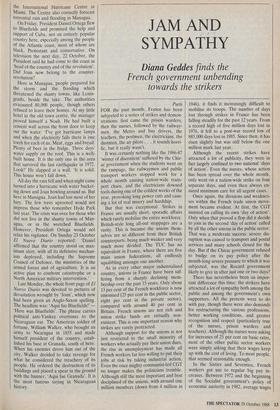JAM AND SYMPATHY
Diana Geddes finds the French government unbending towards the strikers
Paris FOR the past month, France has been subjected to a series of strikes and demon- strations: first came the prison warders, then the nurses, followed by the railway- men, the Metro and bus drivers, the teachers, the postmen, the electricians, the dustmen, the air pilots . . . it sounds horri- fic, but it really wasn't.
It was certainly nothing like the 1986-87 'winter of discontent' suffered by the Chir- ac government when the students went on the rathpage, the railwaymen and public transport workers stopped work for a whole month causing nation-wide trans- port chaos, and the electricians downed tools during one of the coldest weeks of the year, provoking long power cuts and caus- ing a lot of real misery and hardship. But that was exceptional. Strikes in France are usually short, sporadic affairs which rarely mobilise the entire workforce. British-style long all-out stoppages are a rarity. This is because the unions them- selves are so different from their British counterparts, being much weaker and very much more divided. The TUC has no equivalent in France, where there are five main union federations, all endlessly squabbling amongst one another. As in every other major industrialised country, unions in France have been suf- fering from a sharply declining mem- bership over the past 15 years. Only about 13 per cent of the French workforce is now unionised (25 per cent in the public sector, eight per cent in the private sector), compared with around 40 per cent in Britain. French unions are not rich and union strike funds are virtually non- existent. This is one important reason why strikes are rarely protracted. Although support for the unions is not just restricted to the small minority of workers who actually pay their union dues, the rise in unemployment has made all French workers far less willing to put their jobs at risk by taking industrial action. Even the once mighty communist-led CGT no longer makes the politicians tremble. Although still the most important and best disciplined of the unions, with around one million members (down from 4 million in 1946), it finds it increasingly difficult to mobilise its troops. The number of days lost through strikes in France has been falling steadily for the past 12 years. From a record high of five million days lost in 1976, it fell to a post-war record low of 885,000 days lost in 1985. Since then, it has risen slightly but was still below the one million mark last year.
Although the recent strikes have attracted a lot of publicity, they were in fact largely confined to two national 'days of action'. Even the nurses, whose action has been spread over the whole month, only went on a nation-wide strike on four separate days, and even then always en- sured minimum care for all urgent cases.
Once again, the divisions and weaknes- ses within the French trade union move- ment became evident At first, the CGT insisted on calling its own 'day of action'. Only when that proved a flop did it decide to join in the second 'day of action' called by all the other unions in the public sector. That was a moderate success: severe dis- ruption was caused to transport and postal services and many schools closed for the day. But if the Chirac government refused to budge on its pay policy after the month-long severe pressure to which it was subjected, was the Rocard government likely to give in after just one or two days?
There has nevertheless been an impor- tant difference this time: the strikers have attracted a lot of sympathy both among the public and among the government's own supporters. All the protests were to do with pay, though there were also demands for restructuring the various professions, better working conditions, and greater recognition and respect (particularly true of the nurses, prison warders and teachers). Although the nurses were asking for increases of 25 per cent on basic rates, most of the other public sector workers were simply asking that their wages keep up with the cost of living. To most people, that seemed reasonable enough.
In the Sixties and Seventies, French workers got use to regular big pay in- creases. Between 1972 and the beginning of the Socialist government's policy of economic austerity in 1982, average wages rose by a staggering 35 per cent in real terms — faster than in almost any other major industralised country. Since then, however, wages in the public sector have been subject to tight restraint, and have actually fallen slightly in real terms.
This year, the 4.5 million workers in the public sector had hoped for something better, particularly with a party in power traditionally sympathetic to their cause and with all the signs that the economy is at last well on the road to recovery.
France is expected to have an economic growth this year of nearly four per cent, double the rate forecast a year ago. As a result, government revenues are likely to rise by 40 billion francs (about £4 billion) more than forecast. Business profits are booming — up by 15-18 per cent. Indust- rial investment has increased by 15 per cent. The Paris stock exchange has shot over 50 per cent since the beginning of the year. Inflation is down to under three per cent. Unit labour costs are now lower than in Germany, France's main trading part- ner. Workers in the private sector have been getting big bonuses and partaking in profit-sharing schemes. So what about the workers in the public sector?
They have been offered just two per cent this year, meaning a further erosion of their purchasing power. The fact that the global wage bill will increase by 3.6 per cent, after allowing for increases due to promotions and length of service, means nothing to the average worker. He is understandably angry. Both President Mit- terrand and M. Rocard .have been magna- nimously saying that they 'utideistand' the workers' grievances, but then hasten to add that they cannot accord bigger rises without threatening the still fragile econo- mic recovery. In other words, you can have our sympathy, but not our. money. Was that in the end the only difference between the Right and the Left?
Many Socialists, already thoroughly suspicious about the Rocard government's centre-right tendencies (half the govern- ment ministers are non-Socialist moder- ates, centrists, or non-political experts), are not at all happy about the severity of its pay policy and are beginning to grumble about it in public. The important municipal elections are only a few months away, and now is not the time to disillusion many of the Socialist party's most faithful suppor- ters in the public sector, they argue.
But the government is genuinely worried about two fundamental weaknesses in the otherwise steadily improving French eco- nomy: rising unemployment and a hefty trade deficit. There are now 2.6 million jobless in France, representing 10.5 per cent of the workforce. France is one of the few industrialised countries which, for demographic reasons, will continue to face a steady increase in its working population over the next decade, and although there is now a small net creation of jobs, it is still not enough to absorb all the newcomers. • If there is any money to spare, the government wants to use it to help create more jobs, rather than to give more to those who already have jobs. It also wants to avoid any rise in inflation, which would make Fench goods less competitive abroad. After a small trade surplus in 1986 (largely thanks to the fall in both the dollar and oil prices), there was a 32 billion franc deficit last year and it looks as if that may be equalled this year.
For the moment, M. Rocard is con- tinuing to stand firm. He knows he has the support of President Mitterrand. He con- tinues to rise in the public esteem, despite a predictable drop in his popularity rating taken in the midst of the strike. And he has just won a major political victory by getting a first reading of his 1989 budget bill
without having to force the bill through under the very undemocratic procedure laid down in Article 49.3 of the Constitu- tion. (The. Socialists are 14 seats short of an absolute majority in the National Assem- bly.)
The strikes now seem to be petering out after selective additional increases (for the nurses and prison warders), some improve- ments in working conditions, and a prom- ise of a radical re-examination of wage structures throughout the whole of the public sector. For the moment the govern- ment's wage policy of two per cent in- creases this year and 2.2 per cent next year remains intact. But for how long? The simmering discontent is still there and will not be appeased for ever by promises of jam tomorrow.



























































 Previous page
Previous page